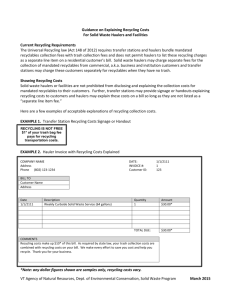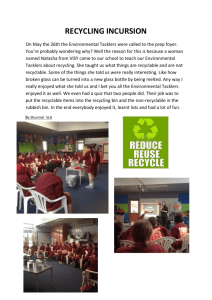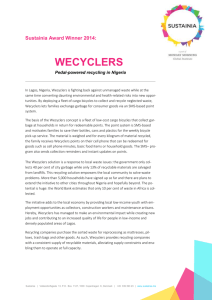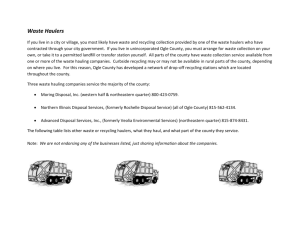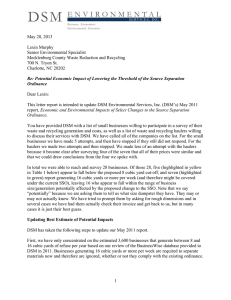commercial_recycling_rules_testimony_-_nylpi
advertisement
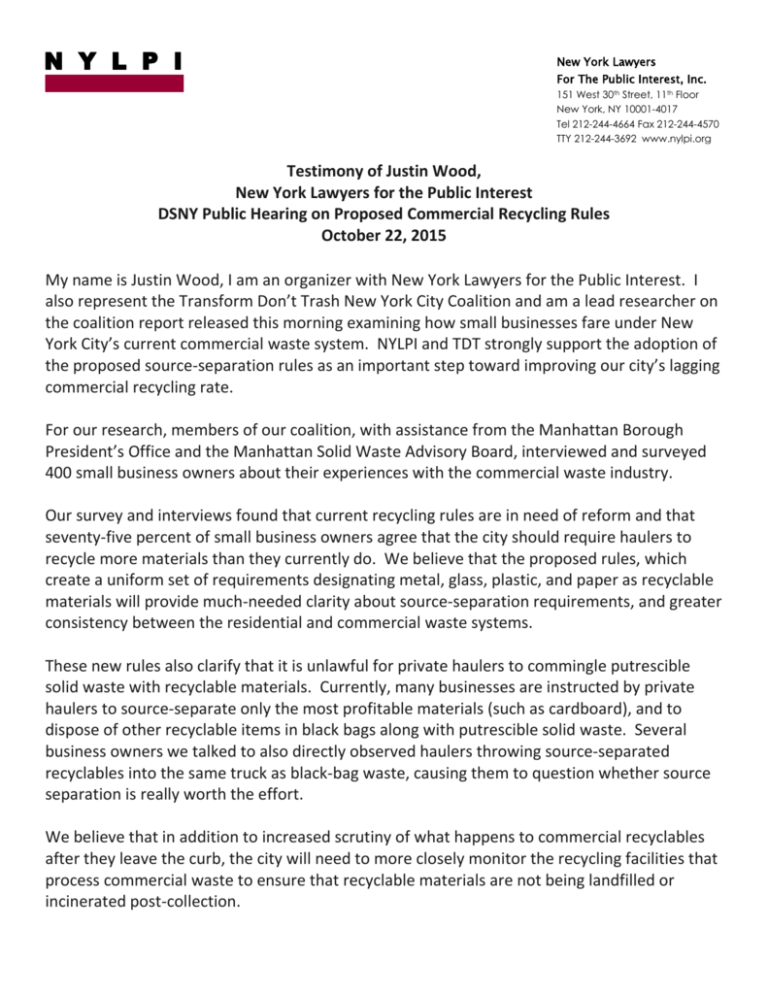
N Y L P I New York Lawyers For The Public Interest, Inc. 151 West 30th Street, 11th Floor New York, NY 10001-4017 Tel 212-244-4664 Fax 212-244-4570 TTY 212-244-3692 www.nylpi.org Testimony of Justin Wood, New York Lawyers for the Public Interest DSNY Public Hearing on Proposed Commercial Recycling Rules October 22, 2015 My name is Justin Wood, I am an organizer with New York Lawyers for the Public Interest. I also represent the Transform Don’t Trash New York City Coalition and am a lead researcher on the coalition report released this morning examining how small businesses fare under New York City’s current commercial waste system. NYLPI and TDT strongly support the adoption of the proposed source-separation rules as an important step toward improving our city’s lagging commercial recycling rate. For our research, members of our coalition, with assistance from the Manhattan Borough President’s Office and the Manhattan Solid Waste Advisory Board, interviewed and surveyed 400 small business owners about their experiences with the commercial waste industry. Our survey and interviews found that current recycling rules are in need of reform and that seventy-five percent of small business owners agree that the city should require haulers to recycle more materials than they currently do. We believe that the proposed rules, which create a uniform set of requirements designating metal, glass, plastic, and paper as recyclable materials will provide much-needed clarity about source-separation requirements, and greater consistency between the residential and commercial waste systems. These new rules also clarify that it is unlawful for private haulers to commingle putrescible solid waste with recyclable materials. Currently, many businesses are instructed by private haulers to source-separate only the most profitable materials (such as cardboard), and to dispose of other recyclable items in black bags along with putrescible solid waste. Several business owners we talked to also directly observed haulers throwing source-separated recyclables into the same truck as black-bag waste, causing them to question whether source separation is really worth the effort. We believe that in addition to increased scrutiny of what happens to commercial recyclables after they leave the curb, the city will need to more closely monitor the recycling facilities that process commercial waste to ensure that recyclable materials are not being landfilled or incinerated post-collection. We also believe that after taking this necessary first step, our city will need additional reforms to increase our commercial recycling rates while protecting small businesses. First, we anticipate that private haulers will use these new rules as a justification for increasing prices, particularly for small business customers that lack market power. A 2008 PriceWaterhouseCoopers [PWC] study conducted for the EDC surveyed 4,000 businesses and found that fully 68% of them did not have a written contract with their hauler, or did not know whether they did. (Our survey found a similar 61% do not have a written contract.) This leaves most businesses vulnerable to sudden price increases. Both PWC and our own survey found that almost all of them [83%-90%] pay a flat monthly fee to their hauler, regardless of how much waste they generate, and do not receive waste surveys. Functionally, this places them beyond the protections of the City’s rate cap and leaves them open to substantial price hikes. In fact, PWC found that most businesses are not even aware of the rate cap. Second, these proposed rules do not designate food waste as a recyclable material, although it comprises almost a third of the commercial waste stream, and is a significant source of greenhouse gas emissions when landfilled. To address these and other problems with NYC’s commercial waste system, we support the adoption of an exclusive collection zone system. Other cities such as San Francisco and Seattle have used similar approaches to ensure that businesses receive free or heavily discounted collection of source-separated materials and organic waste, which has helped them to boost commercial recycling rates to among the highest in the nation. Under such a system, the City can pool the collective purchasing power of small businesses to negotiate fair and stable collection prices with waste haulers. Los Angeles is now implementing a similar system in which waste haulers will compete to serve geographic commercial zones, and both haulers and business customers stand to benefit from the greater efficiency and economies of scale. Businesses can recycle far more materials at stable, affordable prices, while haulers will be able to make investments in the infrastructure and facilities needed to meet rigorous, verifiable diversion rates.
